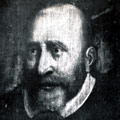ロバート・レコード
表示
| Robert Recorde | |
|---|---|
 ロバート・レコード | |
| 生誕 |
Robert Recorde 1512年ごろ |
| 死没 |
1558年 |
| 国籍 | ウェールズ |
| 研究分野 | 数学者、物理学者 |
| 研究機関 |
オックスフォード大学 王立造幣局 |
| 出身校 |
オックスフォード大学 ケンブリッジ大学 |
| 主な業績 | 等号(=)の考案 |
| プロジェクト:人物伝 | |
ロバート・レコード(Robert Recorde、1512年ごろ – 1558年)は、ウェールズの物理学者、数学者。1557年に等号(=)を考案し、英語話者に対し既に存在していた加号(+)を紹介した[1]。
経歴
[編集]1512年ごろ(1510年とする資料もある[2])、ウェールズのペンブルックシャー、TenbyでThomasとRoseの二男として生まれる[1]。1525年ごろにオックスフォード大学に入学し、1531年にオール・ソウル・カレッジのフェローに選出された。職業としては医学を選択し、1545年に医学博士を取得するためにケンブリッジ大学へ行った。その後はオックスフォード大学へ戻り、ケンブリッジ大学へ行く前と同じように数学を教授した。そののちは、ロンドンへ行きエドワード6世やメアリー1世の医師を務めたようであり、彼らに対し自らが書いた本のいくつかを献呈している。王立造幣局の監査役でもあり、アイルランドで"Comptroller of Mines and Monies"(「鉱山と貨幣の監査官」)を務めていた[3]。政敵に名誉棄損で訴えられたのちに借金で逮捕され、1558年6月中旬までにサザークのキングス・ベンチ刑務所で死去した。
出版物
[編集]

主に教師と学生の間の対話という形で、数学および医学の主題に関するいくつかの著作を発表した。
- The Grounde of Artes, teachings the Worke and Practise, of Arithmeticke, both in whole numbers and fractions (1543),[1]英語で代数学について書かれた最初の本
- The Pathway to Knowledge, containing the First Principles of Geometry ... bothe for the use of Instrumentes Geometricall and Astronomicall, and also for Projection of Plattes (ロンドン, 1551)
- The Castle of Knowledge, containing the Explication of the Sphere both Celestiall and Materiall, etc. (ロンドン, 1556) コペルニクスの太陽中心モデルについて言及しつつ、プトレマイオス天文学を説明する本
- The Whetstone of Witte, whiche is the seconde parte of Arithmeteke: containing the extraction of rootes; the cossike practise, with the rule of equation; and the workes of Surde Nombers (ロンドン, 1557). 日本語では『知恵の砥石』などと表記される。等号が導入された本である。この著作により、レコードは体系的な表記法をもってイギリスに代数学を紹介した人物とされている[4][5]。
- a medical work, The Urinal of Physick (1548), 何度も再版された[6]
著者が不明である本のいくつかが、レコードのものであるとされている。
Cosmographiae isagoge, De Arte faciendi Horologium and De Usu Globorum et de Statu temporum.[7]
関連項目
[編集]脚注
[編集]- ^ a b c Johnston (2004年). “Recorde, Robert (c. 1512–1558)”. Oxford Dictionary of National Biography. Oxford University Press. doi:10.1093/ref:odnb/23241. 26 January 2012閲覧。
- ^ 矢野健太郎『数学質問箱なぜだろう?そこが知りたい!』講談社、1979年12月20日、40頁。
- ^ Newman, James R. (1956). The World of Mathematics
- ^ Jourdain, Philip E. B. (1913). The Nature of Mathematics
- ^ Robert Recorde, The Whetstone of Witte (London, England: John Kyngstone, 1557), p. 236 (although the pages of this book are not numbered). From the chapter titled "The rule of equation, commonly called Algebers Rule" (p. 236): "Howbeit, for easie alteration of equations. I will propounde a fewe examples, bicause the extraction of their rootes, maie the more aptly bee wroughte. And to avoide the tediouse repetition of these woordes: is equalle to: I will sette as I doe often in worke use, a paire of paralleles, or Gemowe [twin, from gemew, from the French gemeau (twin / twins), from the Latin gemellus (little twin)] lines of one lengthe, thus: = , bicause noe .2. thynges, can be moare equalle." (However, for easy manipulation of equations, I will present a few examples in order that the extraction of roots may be more readily done. And to avoid the tedious repetition of these words "is equal to", I will substitute, as I often do when working, a pair of parallels or twin lines of the same length, thus: = , because no two things can be more equal.)
- ^ The Urinal of Physick, by Robert Recorde, 1548; at Google Books
- ^ John Hall, "An Historiall Expostulation", p. 60. In Early English Poetry, Ballads, and Popular Literature of the Middle Ages, v. XI. London: T. Richards, 1844
参考文献
[編集] この記事にはアメリカ合衆国内で著作権が消滅した次の百科事典本文を含む: Chisholm, Hugh, ed. (1911). "Recorde, Robert". Encyclopædia Britannica (英語). Vol. 22 (11th ed.). Cambridge University Press. p. 966.
この記事にはアメリカ合衆国内で著作権が消滅した次の百科事典本文を含む: Chisholm, Hugh, ed. (1911). "Recorde, Robert". Encyclopædia Britannica (英語). Vol. 22 (11th ed.). Cambridge University Press. p. 966.- Newman, James R. (1956). The World of Mathematics Vol. 1 Commentary on Robert Recorde
- Jourdain, Philip E. B. (1913). The Nature of Mathematics
- Roberts, Gareth, and Fenny Smith, eds. Robert Recorde: The Life and Times of a Tudor Mathematician (University of Wales Press, distributed by University of Chicago Press; 2012) 232 pages
- Williams, Jack, Robert Recorde: Tudor Polymath, Expositor and Practitioner of Computation (Heidelberg, Springer, 2011) (History of Computing).
- J.W.S. Cassels, Is This a Recorde?, The Mathematical Gazette Vol. 60 No. 411 Mar 1976 p 59-61
- Roberts, Gordon, Robert Recorde: Tudor Scholar and Mathematician (University of Wales Press, 2016).
- Frank J. Swetz and Victor J. Katz, "Mathematical Treasures - Robert Recorde's Whetstone of Witte," Convergence (January 2011)
外部リンク
[編集]- ロバート・レコードの作品 (インターフェイスは英語)- プロジェクト・グーテンベルク
- Robert Recordeに関連する著作物 - インターネットアーカイブ
- St. Andrew's University Maths History biography
- Robert Recorde and other Welsh Mathematicians
- 100 Welsh Heroes – Robert Recorde
- Earliest Uses of Symbols of Relation
- Earliest Known Uses of Some of the Words of Mathematics This contains numerous quotations from Recorde.
- RECORDE (Robert) in Charles Hutton's Mathematical and Philosophical Dictionary[リンク切れ]
- Robert Recorde's life and works on h2g2
- Current publisher of Robert Recorde's books in the form of original reproductions
